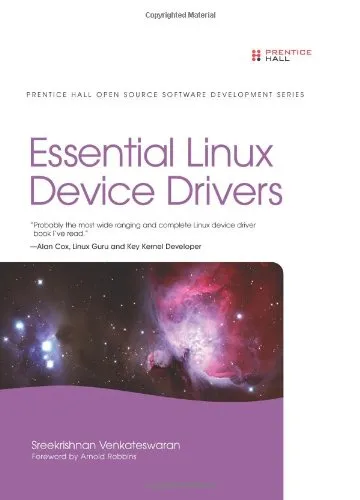Essential Linux Device Drivers
4.5
Reviews from our users

You Can Ask your questions from this book's AI after Login
Each download or ask from book AI costs 2 points. To earn more free points, please visit the Points Guide Page and complete some valuable actions.Introduction to "Essential Linux Device Drivers"
"Essential Linux Device Drivers" by Sreekrishnan Venkateswaran is a comprehensive and authoritative guide for those looking to delve into the world of Linux device drivers. It is an invaluable resource for engineers, system programmers, and technology enthusiasts who want to understand the intricacies of Linux kernel interactions with hardware peripherals. By combining theoretical concepts with practical, real-world examples, this book serves as both a tutorial for beginners and a desk reference for experienced professionals.
The Linux operating system powers an overwhelming majority of servers, embedded systems, IoT devices, and even desktops in today's world. Device drivers are at the heart of this ecosystem, acting as crucial intermediaries that allow software to communicate with hardware components. This book fills a significant gap in the market by providing a structured and accessible explanation of how Linux device drivers are developed, tested, and deployed.
Detailed Summary of the Book
"Essential Linux Device Drivers" serves as a one-stop-shop for learning about the architecture of Linux and the role device drivers play in it. The book covers a wide array of topics, including character devices, block devices, network drivers, PCI drivers, USB subsystem, and power management. It doesn’t merely scratch the surface but dives deep into the subject, showing how drivers interface with the Linux kernel and interact with user-space applications.
The author starts with a solid introduction to the Linux kernel and its subsystems, enabling newcomers to get a grasp of basic kernel development concepts. Subsequent chapters systematically unravel the complexities of driver development for various hardware categories and protocols. The book also addresses modern topics like hotplugging and virtual file systems, making it relevant for today’s rapidly evolving technological landscape.
One of the distinguishing features of the book is the step-by-step code demonstrations. Each key section of the book includes practical code examples that make understanding the implementation details more approachable. Whether it’s writing a simple character driver or debugging a complex USB driver, the book arms you with the skills needed to tackle real-world challenges.
Key Takeaways
- Deep understanding of Linux kernel foundations and programming models.
- Practical insights into writing, testing, and debugging Linux device drivers.
- Comprehensive coverage of driver types, including character, block, and network drivers.
- Detailed exploration of subsystems for PCI, USB, and power management.
- Best practices for managing concurrency, interrupts, and overall driver performance.
Famous Quotes from the Book
"A device driver is the enabling force that transforms a silent piece of hardware into a working, interactive element of a computer system."
"Linux doesn’t just empower the end user; it empowers the developer to mold the system for specific, complex use cases."
"Drivers act as translators, turning electrical signals into data streams comprehensible to the Linux kernel."
Why This Book Matters
The importance of "Essential Linux Device Drivers" lies in its ability to demystify one of the most critical yet complex aspects of Linux systems—device drivers. As Linux extends its dominance across servers, cloud infrastructure, and embedded devices, the need for skilled driver developers has grown exponentially. This book bridges the gap between theoretical understanding and practical implementation, ensuring that readers can confidently tackle the challenges posed by modern hardware.
Furthermore, it equips readers with skills that go beyond driver development, such as debugging techniques, kernel hacking, and efficient use of Linux debugging tools. In an age where open-source contributions are shaping the future of technology, this knowledge enables developers to contribute meaningfully to the Linux community and elevate their careers in the process.
Whether you're a beginner keen to learn about Linux development or an experienced software engineer looking to expand your skill set, "Essential Linux Device Drivers" offers timeless lessons that will stay relevant as technology continues to evolve.
Free Direct Download
You Can Download this book after Login
Accessing books through legal platforms and public libraries not only supports the rights of authors and publishers but also contributes to the sustainability of reading culture. Before downloading, please take a moment to consider these options.
Find this book on other platforms:
WorldCat helps you find books in libraries worldwide.
See ratings, reviews, and discussions on Goodreads.
Find and buy rare or used books on AbeBooks.
1182
بازدید4.5
امتیاز50
نظر98%
رضایتReviews:
4.5
Based on 0 users review
"کیفیت چاپ عالی بود، خیلی راضیام"
Questions & Answers
Ask questions about this book or help others by answering
No questions yet. Be the first to ask!


